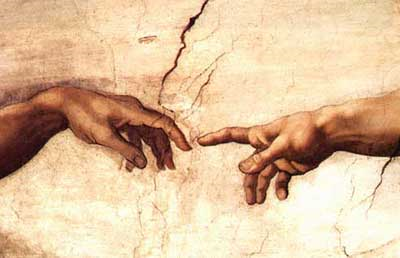It seems to me that there is a promise in the underlying message of Dr. Eben Alexander’s momentous book, Proof of Heaven: A Neurosurgeon’s Journey into the Afterlife. It is a promise that can be realized now in our everyday lives. Beyond our human brain-power and rooted in our very soul, the promise that flowed to me from reading Proof of Heaven is this: We are deeply loved, protected, and guided by God – and that those truths are more real and concrete than anything else in our lives.

Detail from The Creation of Adam by Michelangelo
For me, this promise was gleaned from the soul-sense of recognition I felt as I read about Dr. Alexander’s journey beyond human life. He experienced, for the first time, the concept he calls “true thought” – something that resonated intensely with me. He writes that true thought is the thinking that is outside – and beyond – the brain; the thought that sparks unbounded inspiration, the peace experienced that is deeper than humanity, and the unexplainable sensation when we are sure that God is with us. I love this idea and know it to be true because I have felt it. In moments when I think of just the right sentence to perfectly complete an essay I’m struggling to finish, by the counsel I have given to a friend that even I am stirred by because it didn’t come from me despite my having spoken it, in the glimpses of strength I’ve had to hold on when human hope seems utterly lost. Alexander’s perception of true thought during his afterlife journey is an acknowledgement that each of us is genuinely spiritual. And that not only are we are intensely loved by a compassionate, personal God, but that we have the ability to tap into and cultivate the divinely true aspect of ourselves – “the being that God truly intends us to be,” Alexander writes – today, even now.
The other promise that Proof of Heaven gave me was a still, quiet peace about the beyond in a tangible way. The moment I finished it, I called my mom, who lost her husband of over 40 years and my dad, a few months ago, and suggested she go out and buy the book. Needless to say, in addition to occasionally shouting, “Yes, that’s it!” while reading the book, I smiled often in confirmation of its words, and a few times, I cried.

I’m not necessarily proud to admit that I’ve never paid a great deal of attention to afterlife stories and Near Death Experiences like the one Dr. Alexander experienced – they have always seemed so “out there” to me. That the journey into the afterlife described in Proof of Heaven occurred to Dr. Alexander, a world-renowned neurosurgeon trained at UNC-Chapel Hill, Duke and Harvard – and a life-long spiritual skeptic given his scientific training and study of the brain – is nothing short of miraculous. He is the first one to admit that he previously believed such “Near Death Experiences” (NDE) were medically explainable and caused by the mechanics of the brain, not anything spiritual. But in his case, medical explanations for his NDE are impossible given the particular type of damage that his brain suffered – a trauma that made his brain, essentially, dead and void of all consciousness. Alexander’s NDE case is the first recorded one of its kind – but it mirrors hundreds of others. For me, it added to my awe of God’s wisdom in tapping such a person to write this book.
I am humbled and grateful that Proof of Heaven came my way on the first day of Lent. There is so much to unravel and contemplate in this book. I’m delighted to have the opportunity to comment on it in St. Stephen’s book blog and am thrilled with anticipation for comments by others about their own journeys in reading Proof of Heaven.
2 comments:
Jen, thank you so much for your heartfelt and thoughtful post. I found this thought so striking: "Alexander’s perception of true thought during his afterlife journey is an acknowledgement that each of us is genuinely spiritual." So often we think of spirituality or the realm of the holy as being something outside ourselves; those things "over there" that we maybe aren't sure how to interact with or understand. The idea that connection to God isn't something for which to strive but our natural state-- something we just need to claim-- is such a comfortable starting point. I do think that comes across loud and clear in Dr. Alexander's testimony.
I love your post, Jen. So beautifully said. And it got me to wondering again about how our daily experience in the world sometimes does not support us in our lives of faith and spiritual perceptions. Maybe we're overly busy. Or, maybe our lives are overly full. Or, maybe we are stuck in a skeptical and suspicious mindset that just doesn't trust anything that cannot be explained rationally. The result is that many of us either have to have powerful, otherworldly experiences like Eben Alexander's (we essentially have to die and rise again), or we need spiritual friends who somehow keep reminding us of who we really are and what is truly important. I hope your mother finds the book encouraging and helpful. Thanks for sharing this; you have me thinking about the book in a new way.
Post a Comment